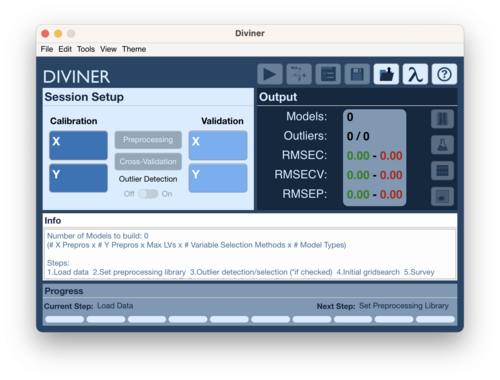Release Notes Version 9 5 0: Difference between revisions
Jump to navigation
Jump to search
| (2 intermediate revisions by the same user not shown) | |||
| Line 5: | Line 5: | ||
(back to [[Release Notes PLS Toolbox and Solo]]) | (back to [[Release Notes PLS Toolbox and Solo]]) | ||
==New Features in Solo and PLS_Toolbox== | ==New Features in Solo and PLS_Toolbox== | ||
=='''Diviner'''== | =='''[[Diviner]]'''== | ||
[[File:Main_Diviner_Interface.png|500px]] | [[File:Main_Diviner_Interface.png|500px]] | ||
Semi-automated modeling that includes | [[Diviner_analysis | Semi-automated modeling]] that includes preprocessing, variable selection, and outlier removal. Semi-automated means the model creator is kept in the loop so their domain-specific knowledge can be used to guide the analysis. | ||
* Select an Eigenvector provided preprocessing library for your domain (NIR, Raman, discrete,...) or build your own. | * Select an Eigenvector provided [[diviner_preprocess | preprocessing library]] for your domain (NIR, Raman, discrete,...) or build your own. | ||
* Detect and review | * [[Diviner_review_outliers | Detect and review outliers]] using robust methods. | ||
* Generate a first round of model candidates and review performance. Use key plots showing overfit ratio vs cross-validation error (RMSECV) to find high performing models. | * Generate a first round of model candidates and [[Diviner_review_results | review performance]]. Use key plots showing overfit ratio vs cross-validation error (RMSECV) to find high performing models. | ||
* Identify the models with best performance and further tune preprocessing, variable selection, and outlier status. | * Identify the models with best performance and further tune preprocessing, variable selection, and outlier status. | ||
* Select a final model and have confidence that an optimal set of parameters have been used to create the model. | * [[Diviner_analysis | Select a final model]] and have confidence that an optimal set of parameters have been used to create the model. | ||
=='''Ensemble Models'''== | |||
=='''[[Ensemble | Ensemble Models]]'''== | |||
Predictions based on a collection of regression models. | Predictions based on a collection of regression models. | ||
* Build an ensemble from a collections of any number of models. | * Build an [[ensemble]] from a collections of any number of models. | ||
* Use model fusion or voting regression to generate a prediction. | * [[Ensemblesearch | Use model fusion or voting regression]] to generate a prediction. | ||
* See a model's calibration error as the root mean squared error of the aggregated predictions from each of the models. | * See a model's calibration error as the root mean squared error of the aggregated predictions from each of the models. | ||
Latest revision as of 13:31, 30 September 2024
Changes and Bug Fixes in Version 9.5
Version 9.5 of PLS_Toolbox and Solo is scheduled for released in October, 2024. See our ZZZZ webinar on new features.
(back to Release Notes PLS Toolbox and Solo)
New Features in Solo and PLS_Toolbox
Diviner
Semi-automated modeling that includes preprocessing, variable selection, and outlier removal. Semi-automated means the model creator is kept in the loop so their domain-specific knowledge can be used to guide the analysis.
- Select an Eigenvector provided preprocessing library for your domain (NIR, Raman, discrete,...) or build your own.
- Detect and review outliers using robust methods.
- Generate a first round of model candidates and review performance. Use key plots showing overfit ratio vs cross-validation error (RMSECV) to find high performing models.
- Identify the models with best performance and further tune preprocessing, variable selection, and outlier status.
- Select a final model and have confidence that an optimal set of parameters have been used to create the model.
Ensemble Models
Predictions based on a collection of regression models.
- Build an ensemble from a collections of any number of models.
- Use model fusion or voting regression to generate a prediction.
- See a model's calibration error as the root mean squared error of the aggregated predictions from each of the models.
Importers
- abbspectrumreadr - Reads an ABB SPECTRUM file into a DataSet object (requires python).
Other Changes
| File | Comment |
| browse |
|
| modelcache |
|
| evrishapley |
|
| parafac |
|
| preprocess |
|
| testrobustness |
|
